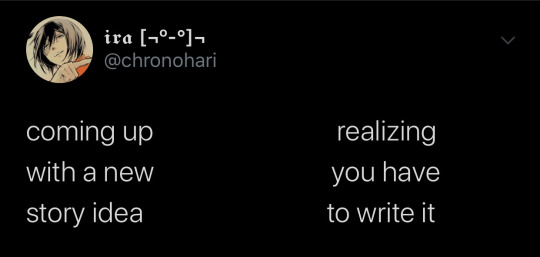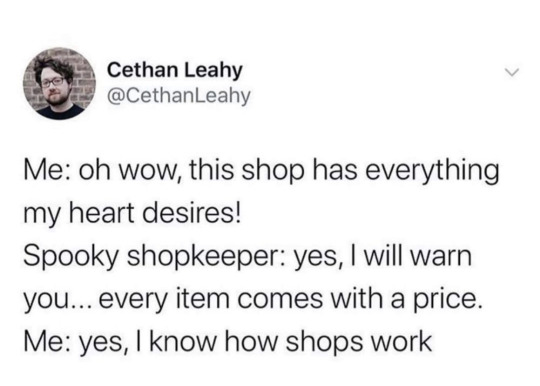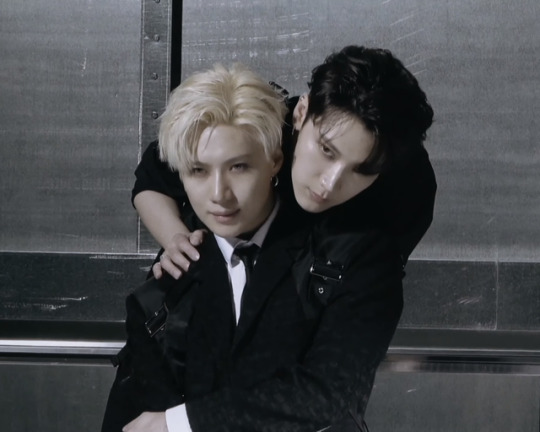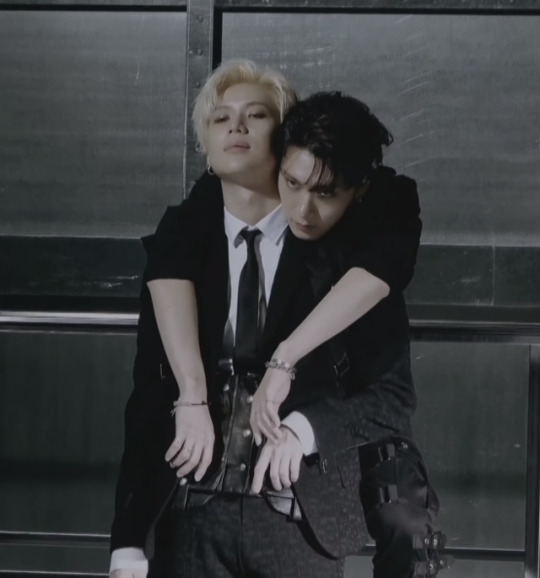Text
Some psychological things for writers (probably typos too)
As someone who likes to breakdown the psychology of characters here is some psychological things.
A trauma doesn’t always appear in the form of nightmares, the brain can block the memory to protect itself but it can appear as lingering things like phobias or just an awkward feeling.
(For romantic stories) Let’s say Character A suffer from a break up which give a chance to Character B to get together with A. But A suffer a lot from the break up and B tries to heal them, B will slowly see that they’re taking advantage of a situation that is making their loved one suffer and B will feel like trash from profiting of the pain of A for their own gain.
The “mere exposure effect” : If a character cames in contact often with something (even something they hate) they will progressively like it or consider it as familiar or reassuring. It’s also one of the factor that comes into place when falling in love, closeness makes the heart grow fonder.
When in a situation of tension, the mere exposure effect applies even more. The brain is in desesperate search of familiarity and will either reject all or be extremely attached to any people getting close.
A character in true despair isn’t a character who screams or cry, it’s one that stays silent and doesn’t even ask question since they’re in too much pain, sadness and sorrow to have any energy to refute or fight against the reality of things. It’s even more effective on characters that are extremely expressive or has a strong temper.
(Just when where on the despair train) Depending on the chracters personnality, despair can be either expressed by sadness (crying, giving up) or anger (struggling, screaming, refusing to accept reality).
When a character loose someone close to them, they will hang on to the other close person to them even harder of fear of loosing them too, as well as being more protective ect.
When something is new, you fear it. Basic instinct.
In a situation of life or death, even the most stoic person can break by simple shock. Like I said, the brain is panicked and hangs on tight to anything familiar.
A real asshole doesn’t break people physically, but emotinaly. Female villains do that more than male ones do by the way.
Familiar = good. Basic Instincts as well.
For a character that has a hard time making social connection when they do have one, they will hang on to it with all their might and feels like they must protect the other at all cost.
“Friends are the family you choose” keep that in mind.
Even when a character is like : “Yeah I would die for this or that”, the fear of death is extremely real and the brain tries to reject it at all cost.
The most precious person to someone isn’t always someone you love romantically.
When you truly care for somebody you don’t say to them the things they want to hear but the things they NEED to hear.
Everything can be important. To a person, a object, or a word.
Love is a slow process. And even if love at first sight exist it takes time as well to realise it ect.
Tolerance to pain and torture change by each person.
Everybody can be manipulated or angered. You just need to push the right buttons.
Facing a threat they are three main reactions : Submission. Opposition. Evasion.
Their is always a reason for everything in a characters personnality. Little events can do major changes.
Sometimes when you’re exhausted you can get angry easly since you want people to leave you alone.
A character with a low self-confidence assure all the time that what they’re saying insn’t meant to offense.
(While I’m on low self-esteem) When those characters tries to do something but can’t no matter how hard they try, they can’t stop themselves from crying, it’s incontrollable. The brain wants to show to the poeple around the struggle they’re in like a call for help.
I have more things to write but since I’m scared my computers gonna crash I’m going to post only this for now I’ll update later.
3K notes
·
View notes
Photo

i made a meme to express how i feel right now
51K notes
·
View notes
Note
What are the reasons why kingdoms are divided or have bad blood?
Divided Kingdoms & Bad Blood Between Kingdoms
Quick Note: Kingdoms are a political division of land, wherein everyone in a particular area falls under the rule of a particular monarchy. Kingdoms (as in more than one kingdom occupying a single land mass) are naturally “divided” by political rule, borders, and culture. That said, I’m not sure if you’re asking what causes bad blood between kingdoms or if you’re asking what would divide a single kingdom. So, I’ll go ahead and answer both.
Divided Kingdoms
When a kingdom becomes divided, it’s usually rooted in a power struggle over the throne. This can be because the kingdom’s nobility have lost faith in the current monarch, or they have no faith in the heir who is ascending the throne upon the current monarch’s imminent death. Occasionally, it can even be the greater citizenry of the kingdom who have lost faith in the monarch and the nobility, and they rally behind their own choice for a new monarch. All it takes is for people with power, or who are capable of amassing the necessary force, to rally behind their choice, and a monarch can be overthrown. But, not everyone will rally to the new cause. Some will stay loyal to the current monarch, and that’s where you see the division created. Nobles and citizens alike can be divided due to whichever side they’ve chosen.
Bad Blood Between Kingdoms
Bad blood between kingdoms is a bit more complicated, but a lot of the time it comes down to fighting over territory (as do most wars.) You might have several smaller kingdoms being conquered by the most powerful kingdom among them, in which case you may even have neighboring kingdoms fighting because one is bowing to the rule of the conqueror while the other wants to stay independent. You might have two kingdoms fighting over a disputed territory between them, or fighting over a newly discovered territory. You can have two kingdoms who are allies until one accepts a more lucrative alliance with the other kingdom’s rival. You can also have bad blood when an alliance failed because one side didn’t hold up their end of the alliance when needed. You could even have bad blood develop between two kingdoms because of religious differences, their stance on magic (if you’re writing a fantasy), or really any political or cultural differences. Trade issues would be another possibility... one kingdom could be making another kingdom’s trade with a third kingdom more difficult by hampering or blocking their trade route, or by taxing the goods they transport through the kingdom. Or, maybe they’re just charging ridiculous taxes on the items they’re exporting to the other kingdom, or refusing to pay a reasonable amount for imported items.
Best of luck with your story!
————————————————————————————————-
Have a question? My inbox is always open, but make sure to check through my FAQ and post master lists first to see if I’ve already answered a similar question. :)
179 notes
·
View notes
Photo

because @nyxnevin said this meant something in her tags so here it is in tweet format. it’s also a great opportunity for shamelessly promoting my twitter!!!!!
4K notes
·
View notes
Text
me: okay time to jump into the action scene
me: don’t say it
me: don’t say it
me: don’t say it
me: don’t say it
me: don’t say it
me: don’t say it
me: don’t say it
me: don’t say it
me: … “SUDDENLY”
84K notes
·
View notes
Photo


sunsets in the conservatory are something else
83K notes
·
View notes
Text
some mini collections of tips for writers
(based on things that yours truly notices as an editor-in-training. This list is in no way complete, and will probably be added to as I continue to find repeated mistakes)
Dialogue
Use beats in your dialogue to break it up. Even “said” can make a very effective beat between lines.
(No beats: “It’s not lethal. Just highly dangerous with a good chance of being mutilated.” // Beats: “It’s not lethal,” he said. “Just highly dangerous with a good chance of being mutilated.”)
Note how the break allows a bit of a pause for ~dramatic effect
thinking of dialogue, use punctuation and distinct speech patterns! “Life, uh, finds a way.” is an iconic line anyway, but Jeff Goldblum’s signature verbal tic gives it character.
It’s okay if characters stutter. Don’t let the condemnation of stuttering characters as “cringey” in fanfic put you off. (and on that note, fuck cringe culture. Seriously. It saps all the fun out of creativity and fun is important.)
Start! A! New! Line! Whenever! Someone! New! Speaks!!
DO NOT FEAR THE WORD “SAID”
Setting & Blocking
Use the landscape and settings around your character, and always, always remember a scene’s blocking. Where is everything in relation to your characters? Have you left someone holding a coffee cup for the last three scenes? Did you lose a character somewhere along the way?
using the contents of a scene is also great for fight sequences.
Similarly, large character casts are hard to keep track of so don’t be afraid to break them up. Sending someone off somewhere else can create some nifty little subplots.
Keep a personal note of how time passes. Trust me, it’s incredibly helpful to you as a writer and also for future readers.
Characters
Character growth does not have to be positive. Sometimes characters fail or suffer or get their motivations twisted up, and they finish the book as a villain rather than a hero.
All that matters is that a character changes throughout the plot in a way that readers can see; the sort of change they go through is entirely up to you.
scrap the idea that someone has to deserve a redemption arc. They probably don’t deserve it, which is the whole point. So don’t be afraid to make your villains seem completely irredeemable.
and you don’t need to redeem your antagonists in order to make them complex, sympathetic villains, anyway. Sometimes people get so stuck in their beliefs that they can’t see another way and it goes too far. Not everyone comes back from that.
Also, motivations and goals can absolutely change. That’s okay. You just need to have something that drives your character so that your readers are rooting for them.
Protagonists don’t need to be heroic. How you define the protagonists and antagonists in your story is based entirely on the morality in your story-world, NOT the moral ideas in the real world. What counts as a complex protagonist in a world torn apart by biological warfare will be very different than one living in our world.
Prose & Grammar
simple prose is just fine and you don’t need to fluff it up for pretty quotes.
Remember to vary your sentence structures and length. Start smaller and build it up, drawing your reader’s attention.
“And” and “But” are very valid sentence starters that are great for communicating the tone of internal narrative. You’re allowed to tweak grammar if that’s helpful for telling the story, it just needs to be accessible. Test out what you’ve written on other people.
Check that your tenses are consistent!!
25K notes
·
View notes
Text
Quick And Dirty Tips For Creating Subplots
– Not everyone should love the hero.
– The more antagonists you have the more conflicts you create.
– Real life should happen to the characters, even if they are saving the world they have jobs and responsibilities.
– Give the character interests and friends outside of work.
– Multiple point of views aren’t a bad thing if you know how to juggle them.
– It all needs to come together at the end.
– Not every antagonist needs to be vanquished at the end.
– – Give us more than one character to love– (from Diantha)
— Make each and every character count — (from Diantha)
Stories need subplots. Make sure yours has one.
39K notes
·
View notes
Text
Things to Consider when Creating a Magic System
What are the drawbacks of using magic? Does it have mental, physical, and/or emotional consequences for the user?
What tools are needed to harness magic? Wands? Spells? Magical artifacts?
How do people learn magic? Instinct? In school? From family members?
Can everyone use magic or are only certain people capable of using it?
Is the capability to use magic hereditary? What about different ways of using magic (transformation powers, teleportation, etc.)?
What is impossible for magic to do?
How long does it take to master different magical skills?
Can creatures other than humans learn magic? Are different creatures better at using different kinds of magic?
Does it require spells to be spoken, written, or thought?
Is it possible for someone to lose their magical abilities?
How do characters’ emotions affect their ability to use magic? Do their emotions affect the magic’s intensity or controllability?
How does the strength of a person’s magical abilities change as they age?
Can people normally perform any kind of magic or can they only perform things that fall under their specialty? Are their exceptions?
What rules restrict magic use in society?
How do people’s magical abilities impact their career prospects?
What kinds of magic are the most feared or seen as the most powerful? Which are seen as mere jokes?
How do people use magic to help with everyday tasks?
Can magical energy be stored for later use?
What objects or other factors can amplify someone’s magical powers?
When do magical abilities initially manifest? From birth? At a certain age? Under certain conditions?
What is the first spell a character is likely to learn?
What happens if a spell is performed incorrectly? Nothing at all? A weaker version of the intended results? Pain?
Can different spell casting methods be used to obtain the same result? What are their advantages and disadvantages?
25K notes
·
View notes
Text
If being friends with a bunch of fic writers has taught me one thing, it’s that not a damn one of you can finish a fic without starting another halfway through. Your minds
39K notes
·
View notes
Text
When to "Tell" Emotions

Over the years, I’ve written a lot of posts about emotions, how to get them on the page, how to get them in the reader, how strong they should be and when, and so on. Writing an emotionally powerful story is super important, but honestly, other than Angela and Becca at Writers Helping Writers, I don’t see a ton of solid advice on how to actually infuse your story with it.
In the past, I’ve talked about how one of the most important things is to create an empathetic experience in the reader, so they feel like they are experiencing those emotions instead of just reading about them. This is equivalent to the “Show, don’t Tell” rule, even if “showing” emotions, is often less about describing them, and more about describing what causes them and/or getting into the deepest POV penetration available.
Basically, what I’m trying to say is that usually if you want to have your audience have a very powerful emotional experience, you write in a way that allows them to vicariously feel those emotions, rather than just “telling” the audience what emotions were felt (i.e. Patricia was sad).
However, like the traditional “Show, don’t Tell” rule, if you never “tell” the audience what emotions characters are feeling, you run into some problems. So today, I want to talk about when you should absolutely consider simply telling the audience your characters’ emotions, or at least simply demonstrating them in a short amount of space.
1. It’s Important for the Audience to Know the Emotion, but Not Necessarily to Experience it.
Sure, for a powerful story, we want our audience to experience the same emotions as our protagonist (usually). If a character is devastated, we want our audience to feel devastated.
But sometimes the point isn’t to experience the emotion. Sometimes the point is just to know about it.
I’ve used this example elsewhere, but in The Hunger Games, after Katniss shoots the apple out of the pig’s mouth, Collins writes something like, “I cried about it all afternoon.” In that instance, it’s not important that the audience feels like crying. It’s just helpful to know that Katniss did.
Not all of the protagonist’s emotions will be important enough to experience. Some of them are just important to know.
2. Pacing
If Collins had instead tried to write a whole passage to elicit those feelings in the audience, it would have taken up a lot more space, and therefore would have slowed the story’s overall pacing. Sometimes pacing is more important than feelings (especially if you are going so slow that the audience doesn’t feel the intended feelings anyway because they are yawning).
With that said though, depending on the setup of the scene, you can sometimes elicit emotion in very few words. Other times? Well, it might be best to just say “I cried about it all afternoon.”
3. Emotional Context
Context is the stuff that helps us accurately interpret and understand what’s going on in the story. Usually, the viewpoint character provides the audience with needed context.
In some passages, the audience needs emotional context to properly interpret the narrative. This may be especially true of speculative fiction, where the audience may be encountering other worlds, cultures, and customs. For example, when Harry sees someone walk out of a picture frame for the first time in the Wizarding World, he looks to Ron in surprise. Ron says, unconcerned, “Well, you can’t expect him to hang around all day.” Ron’s nonchalance clues us into the fact that this is normal for the Wizarding World (while Harry’s surprise validates our own).
In similar ways, your viewpoint character’s emotions may provide context for how readers are supposed to view the world and certain situations. A lot of times, the best way to get this across, is to just tell us straight out what the character is feeling, rather than try to get the audience to feel that way (which would be extremely difficult if the subject matter was otherworldly).
4. Emotional Validation
In the last example, I mentioned that Harry’s surprise validates our own. If Harry wasn’t surprised, we’d probably think he was odd, or maybe that there is something wrong with us for having that response.
Sometimes you need to simply address and tell emotions in order to validate the audience’s. If something really terrifying happens, and the viewpoint character or protagonist doesn’t show any sign of emotion, we might be left scratching our heads. Were they terrified? Is there something wrong with them? Did we misunderstand how that passage should be read?
Validation and context often interrelate. You can learn more about validating the audience here.
5. Hooks
Sometimes the best hooks address emotions directly. Something like, “When William went to sleep last night, he hadn’t expected to wake up in terror,” can have readers drooling to read on. Or perhaps, “As Emily stared into Jack’s eyes, she thought this must be what it felt like to fall in love with a villain.” Or maybe, “Clark walked into his mother’s motor home and was shocked.” Whatever the case, labeling an emotion can be a great hook.
6. To Cut Back Overpowering Emotions
In some cases, you might elicit emotions so powerfully, that it’s simply too much. It’s possible to write too strong of a scene. In situations like that, simply telling an emotion can weaken it enough to make it digestible for the audience.
So there you have it, six instances where you don’t necessarily want the audience to feel empathetic emotions.
960 notes
·
View notes









